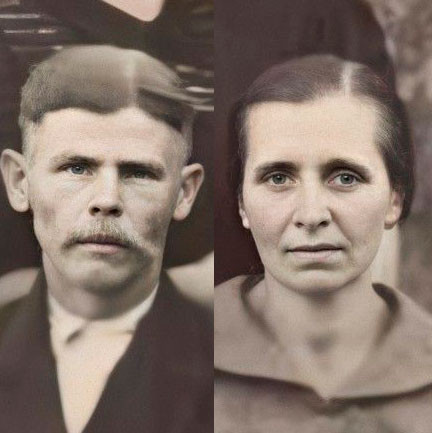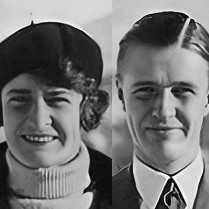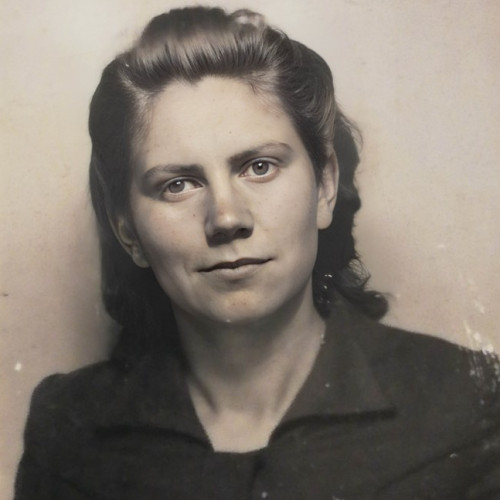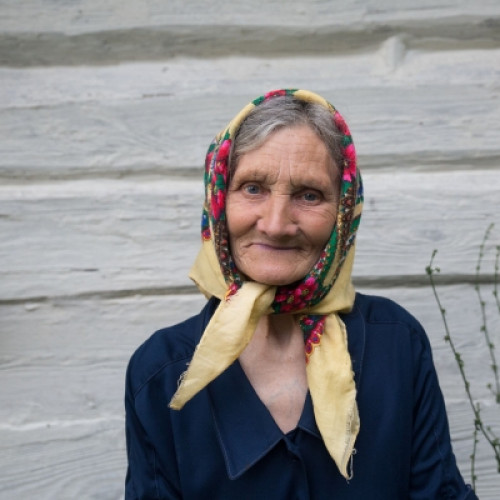Anton Parfeniuk (1890–1947) Lubow Parfeniuk (1903–1967) - Instytut Pileckiego
Anton Parfeniuk (1890–1947) Lubow Parfeniuk (1903–1967)
Awarded in 2023.

The Parfenyuks produced the best cottage cheese and cream in Kisielin. The land of Volhynia had been especially favorable to them, and, in addition to milk and dairy products, the family also traded in agricultural produce.
Lubow Parfeniuk (1903–1967) Anton Parfeniuk (1890–1947)
Among their neighbors, all of whom readily purchased from Liubov and
Anton Parfeniuk, were the Dębskis. Kisielin was known not only for its fertile lands, but also for the baroque local church. The temple was spacious, and could easily accommodate both nearby residents and the faithful who arrived from neighboring villages and settlements. After Sunday Mass on 11 July 1943, a large group of armed Banderites forced their way into the church. During the attack, they murdered around 90 people, however others managed to flee to the first floor of the presbytery, which became their stronghold for the next 11 hours. Four more people died in the course of the siege, while six were wounded. Shrapnel from a grenade hit Włodzimierz Sławosz Dębski in the leg. On the next day, Włodzimierz was taken to the homestead of Liubov and Anton Parfenyuk:
“I lay there, in the barn, until Thursday, when I was taken to a hospital. My
father also hid there, and this is where we placed our belongings and some
of our valuables,” Dębski related.
Tragically, his parents were captured and murdered by members of the Ukrainian Insurgent Army just two weeks later. The Banderites learned about the help which the Parfenyuks had given. They made numerous attempts to intimidate Liubov, demanding that she give up items left by the Poles, however she steadfastly refused. Anton died in 1947, while Liubov survived him by twenty years.
“[After] the defense during which I got injured, I was taken to her [Liubov’s] farmstead. I lay there, in the barn, until Thursday, when I was taken to a hospital. My father was also hiding there, and this is where we placed our belongings and some of our valuables. (...) Members of the Ukrainian Insurgent Army repeatedly harassed Liubov, demanding that she give up our belongings, but she refused.”
Włodzimierz Sławosz Dębski, Siedmiu sprawiedliwych z Kisielina [in:] Bracia zza Buga. Wspomnienia z czasu wojny, Lublin 2018
See also
- Erzsébet Szápáry (1902-1980) Antal Szápáry (1905-1972)

awarded
Erzsébet Szápáry (1902-1980) Antal Szápáry (1905-1972)
Erzsébet and Antal Szápáry came from a famous family of Hungarian aristocrats. Their mother, Maria Przeździecka, was a Pole, and this fact had a bearing on their involvement in relief activities for Polish refugees after 1939.
- Hélène Pionstka z d. Waldmann

awarded
Hélène Pionstka z d. Waldmann
(1921–2009)In 1941, the Germans established a POW camp for Polish soldiers close to the farm of Émile and Alice Waldmann in Ursprung, Alsace.
- Ołeksandra Wasiejko z d. Łukaszko (ur. 1946)

awarded
Ołeksandra Wasiejko z d. Łukaszko (ur. 1946)
During the Volhynia Massacre in the summer of 1943. Over the next seventy years Oleksandra Vaseyko kept alive the memory of the victims, bringing flowers to their graves and keeping them in her prayers.


